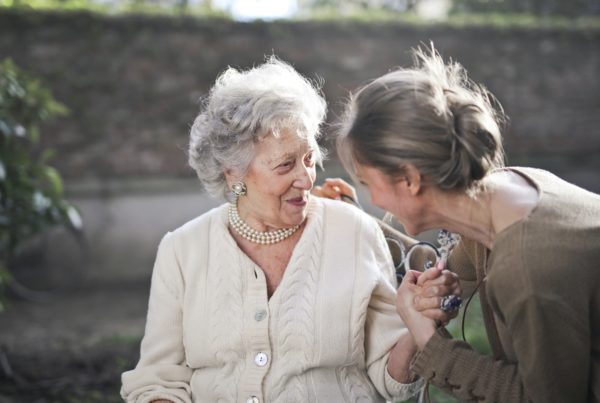The nature of dementia means that the person with the condition can change from moment to moment with varying abilities to communicate. There are also ways to deal with memory loss that can limit distress to the person, as well as having difficulty with understanding and speaking.
Language and communication problems occur in all types of dementia. They may have trouble finding the right word and try to use alternatives, or they may talk fluently but not be making sense.
Communication is important for the person with dementia and it is important that you continue to communicate and persevere when it become tough. The person with dementia needs the opportunity to communicate their needs, wishes and feelings.
If a person with dementia is unable to communicate, it can cause a loss in their confidence, and make them feel anxious or depressed. They may also present behaviours that are difficult to deal with. You will need to ensure that you are prepared so that you can have effective and regular communication with them.
Prepare Yourself
Ensure that you feel calm and be ready to be patient. This can help the person with dementia feel more comfortable and therefore communicate with you more readily and easily. Make sure that you have planned enough time so that you don’t appear to be pushed for time.
It is best to aim for regular and fairly short conversations with them.
Timing
There might be a best time of the day when the person usually seems to have more focus. Make sure it’s also not a time when they may be feeling hungry or tired – ensure their needs are met before engaging in conversation wth them.
The person may become tired, look at their body language. If they become fidgety or impatient, consider that they may be tired and it’s time to bring the conversation to a close.
Environment
When you need to have a conversation with a loved one with dementia, it’s important to ensure the environment is right. Good lighting and no distractions like the radio or television.
Position yourself at eye level or below, and respect their personal space.
Body Language
Watch for body language, this can tell you many things that the person with dementia may be unable to express. If you are focussing on the non-verbal signals, including facial expressions, you might pick up on other things the person is trying to communicate, such as pain and feelings for example.
Keep your own body language open and relaxed and ensure that your facial expressions confirm what you are saying. The person with dementia is still able to read body language. Keep everything fairly slow and deliberate.
Make contact with them to reassure, this might be holding their hand while you communicate if that is appropriate and comfortable to you both.
Speaking
Speak calmly and clearly, using simple short sentences and avoid raising your voice. Keep your tone of voice light, positive and friendly.
Always speak in a conversational way so that the person doesn’t feel questioned as this may cause them to close off from you, become annoyed or feel threatened.
Stick to one topic at a time of possible so that things are less confusing for them.
Allow them to finish what they are saying without interrupting, it can take them longer to communicate and they will feel better if they are able to finish without break in their thinking.
Listening
Use active listening skills, reassure and encourage the person. If you are unsure what they are communication, try paraphrasing back to them with your understanding of what they are saying. Try and see beyond the dementia. There may be things they communicate that are not necessarily in context but can give clues about their needs.
Inclusion
It’s important that when others are around that you don’t talk about the person in the third party and that you include them in conversations.
More Ways to Encourage Conversation
If you found this article useful, you may also wish to read 10 Stimulating Activities for People with Dementia




